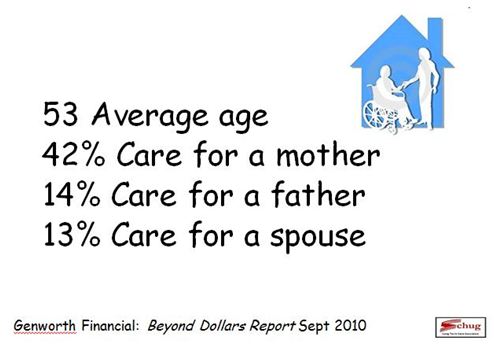Generally long-term care refers to a wide range of of personal care and other services provided over an extended period of time (90 days) to people who need help with basic activities of daily living (ADL's) or who need supervision due to severe cognitive impairment. This can occur due to aging (frailty),disease, or accident.
How Benefits Are Triggered
In 1996 Federal Government passed the "Health Insurance Portability and Accountability Act" (HIPAA) that set the standards on how benefits would be triggered for all Long-Term Care Insurance. Either the need for "substantial assistance" in at least two of six ADL's (Bathing, Dressing, Transferring, Toileting, Continence and Eating). Or due to "severe" cognitive impairment needing "substantial supervision".
- Substantial assistance meaning either in the form of "hands on assistance" or "standby assistance".
- Severe cognitive impairment means a loss of intellectual capacity to the point that one is endangering himself or those around him
- Standards are certified by a licensed health care practitioner and meet the 90 day requirement.
Home Care
Traditionally Home Care begins at home with the support of family and friends. With a plan of care provided by a "Care Manager" LTCi can provide reimbursement for the cost of.
- Personal Assistance provided by a "Care Giver"
- Bathing, Dressing, Transferring
- Respite Care
- Homemaker Services
- Shopping/Driving
- Money Management
- Meal Preparation
- Medication Management
- Light Housework
- Home Health Care provided by a licensed medical
practitioner
- Hospice Care for the Terminally ill (Note: Long Term Care Insurance will coordinate with Medicare)
- Adult Day Care provided in the community
Facility Care
Home care is practical only for those with limited need for assistance - one that does not involve extensive medical treatment or continuous care or observation. Facility care is at times more appropriate in serving the patients needs. There are two types of Care Facilities: Residential Care (RCF) and Skilled Nursing Facility (SNF) or Nursing Home.
Assisted
Living provides
for a social environment with 24-hour supervision and assistance to residence
who have minor medical problems and may or may not need help with bathing,
dressing and transferring. Some Assisted
Living facilities provide safe secured areas for those who with mild to
moderate cognitive impairment. These
communities offer private, semi-private or small apartments. They typically provide social activities and
a central dinning room. They typically
charge a monthly fee with additional services added depending the level of care required.
Board
and Care facilities
are converted single family homes providing assistance for up to six
residents. They provide “hands on care”
with a more home-like atmosphere. Some
facilities off secure supervision and may also provide recreational and social
activites.
Skilled
Nuring Facility also
referred to as nursing home, conversant hospitals or vocational rehab facility provide
for 24 hour nursing services. Many SNF’s
off sub-acute care and specialized medical programs like: respiratory therapy
services,ventilator care, tracheotomy care , IV services and Hospice. Sage 3 -4 Alzeihmer’s or dementia facilities are also licensed as
SNF’s.
Summary:
RCF’s provide a Social environment and can assist in providing three ADL’s (Dressing, Bathing and Transferring). SNF’s provide a Medical environment for
patients who require medical assistance on a daily basis.
SchugTheLTCGuy.com





























